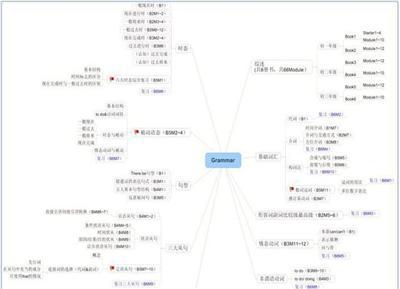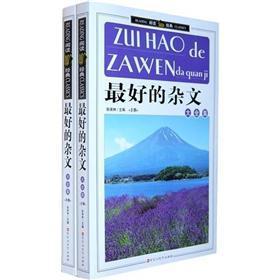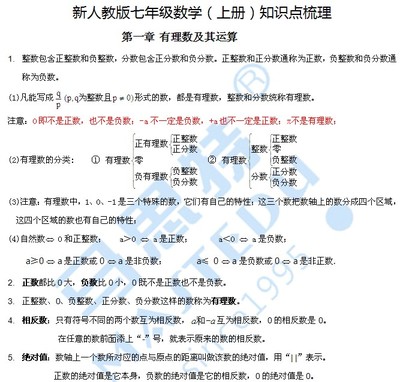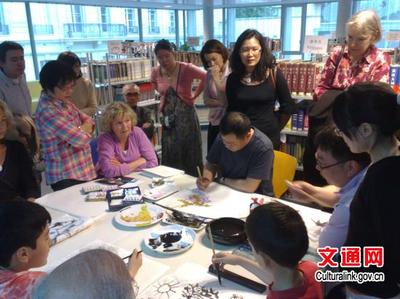初一英语语法总结
初一英语语法虽然是从简单的一些日常用语出发的,但语法中常会有一些知识点看起来很细小,容易被忽视,但这些知识点掌握不熟练,往往会造成一些语法应用上的错误。因此在学习初一英语语法时,要认真、细心,不要觉得一些地方不重要而得过且过。
下面从几个方面,总结出了初一英语语法,如果要复习英语句法的同学,可以参考一下,
一、初一英语语法——词法
1、名词
A)、名词的数
我们知道名词可以分为可数名词和不可数名词,而不可数名词它没有复数形式,但可数名词却有单数和复数之分,复数的构成如下:
一)在后面加s。如:fathers, books, Americans, Germans, apples, bananas
二)x, sh, ch, s, tch后加es。如:boxes, glasses, dresses, watches, wishes,faxes
三)1)以辅音字母加y结尾的变y为i再加es 如:baby-babies, family-families, duty-duties,comedy-comedies, documentary-documentaries, story-stories
2)以元音字母加y结尾的直接加s。如:day-days, boy-boys, toy-toys, key-keys,ways
四)以o结尾加s(外来词)。如:radios, photos, 但如是辅音加o的加es:如: tomatoes西红柿,potatoes马铃薯
五)以f或fe结尾的变f为v再加es(s)。如:knife-knives, wife-wives, half-halves,shelf-shelves, leaf-leaves, yourself-yourselves
六)单复数相同(不变的)有:fish, sheep, deer鹿子, Chinese, Japanese
七)一般只有复数,没有单数的有:people,pants, shorts, shoes, glasses, gloves,clothes, socks
八)单词形式不变,既可以是单数也可以是复数的有:police警察局,警察, class班,同学, family家,家庭成员
九)合成的复数一般只加主要名词,多数为后一个单词。如:action movie-action movies, pen pal-penpals; 但如果是由man或woman所组成的合成词的复数则同时为复数。如:man doctor-men doctors,woman teacher-women teachers
十)有的单复数意思不同。如:fish鱼 fishes鱼的种类, paper纸 papers报纸,卷子,论文, work工作works作品,工厂, glass玻璃 glasses玻璃杯,眼镜, orange桔子水 oranges橙子, light光线lights灯, people人 peoples民族, time时间 times时代, 次数, chicken 鸡肉 chickens小鸡
十一) 单个字母的复数可以有两种形式直接加s或’s。如:Is (I’s), Ks (K’s)。但如是缩略词则只加s。如:IDs,VCDs, SARs
十二) 特殊形式的有:child-children, man-men, woman-women, foot-feet,mouse-mice, policeman-policemen, Englishman-Englishmen
B)名词的格
当我们要表示某人的什么东西或人时,我们就要使用所有格形式。构成如下:
一)单数在后面加’s。如:brother’s, Mike’s, teacher’s
二)复数以s结尾的直接在s后加’,如果不是以s结尾的与单数一样处理。如:Teachers’ Day教师节, classmates’;Children’s Day六一节, Women’s Day三八节
三)由and并列的名词所有时,如果是共同所有同一人或物时,只加最后一个’s,但分别拥有时却分别按单数形式处理。如:Mike andBen’s room迈克和本的房间(共住一间),Mike’s and Ben’s rooms迈克和本的房间(各自的房间)
2、代词
项目 人称代词 物主代词 指示代词 反身代词
人称 主格 宾格 形容词 名词性
第一人称 单数 I me my mine myself
复数 we us our ours ourselves
第二人称 单数 you you your yours yourself
复数 you you your yours yourselves
第三人称 单数 she her her hers herself
he him his his himself
it it its its this that itself
复数 they them their theirs these those themselves
3、动词
A) 第三人称单数
当动词是第三人称单数时,动词应该像名词的单数变动词那样加s,如下:
一)一般在词后加s。如:comes, spells, waits, talks, sees, dances, trains
二)在x, sh, ch, s, tch后加es。如:watches, washes, wishes, finishes
三)1)以辅音字母加y结尾的变y为i再加es。如:study-studies, hurry-hurries,try-tries
2)以元音字母加y结尾的直接加s。如:plays, says, stays, enjoys, buys
四)以o结尾加es。如:does, goes
五)特殊的有:are-is, have-has
B) 现在分词
当我们说某人正在做什么事时,动词要使用分词形式,不能用原形,构成如下:
一)一般在后加ing。如:spell-spelling, sing-singing, see-seeing,train-training, play-playing, hurry-hurrying, watch-watching,go-going, do-doing
二)以不发音e的结尾的去掉e再加ing。如:dance-dancing, wake-waking, take-taking,practice-practicing, write-writing, have-having
三)以重读闭音节结尾且一个元音字母+一个辅音字母(注意除开字母组合如show –showing,draw-drawing)要双写最后的辅音字母再加ing。如:put-putting, run-running,get-getting, let-letting, begin-beginning
四)以ie结尾的变ie为y再加ing。如:tie-tying系 die-dying死 lie-lying 位于
4、形容词的级
我们在对两个或以上的人或物进行对比时,则要使用比较或最高级形式。构成如下:
一) 一般在词后加er或est(如果是以e结尾则直接加r或st)。如:greater-greatest, shorter–shortest, taller –tallest, longer –longest, nicer- nicest, larger-largest
二)以重读闭音节结尾且1个元音字母+1个辅音字母(字母组合除外,如few-fewer fewest)结尾的双写结尾的辅音再加er/est。如:big-bigger biggest, red-redder reddest, hot-hotterhottest
三) 以辅音字母+y结尾的变y为i加er/est。如:happy-happier happiest, sorry-sorriersorriest, friendly-friendlier friendliest(more friendly mostfriendly), busy-busier busiest, easy-easier easiest
四)特殊情况:(两好多坏,一少老远)
good/well - better best many/much - more most bad/ill – worseworst
little- less least old- older/elder oldest/eldest far-farther/further farthest/furthest
5、数词 (基变序,有规则;一、二、三,自己背;五、八、九、十二;其它后接th;y结尾,变为i, eth跟上去。) first,second, third; fifth, eighth, ninth, twelfth; seventh, tenth,thirteenth, hundredth; twenty-twentieth, forty-fortieth,ninety-ninetieth
二、初一英语语法——句式
1.陈述句
肯定陈述句 a) This is a book. (be动词)
b) He looks very young. (连系动词)
c) I want a sweat like this. (实义动词)
d) I can bring some things to school. (情态动词)
e) There’s a computer on my desk. (There be结构)
否定陈述句 a) These aren’t their books. b) They don’t look nice.
c) Kate doesn’t go to No. 4 Middle School. d) Kate can’t find herdoll.
e) There isn’t a cat here. (=There’s no cat here.)
2. 祈使句
肯定祈使句 a) Please go and ask the man. b) Let’s learn English!
c) Come in, please.
否定祈使句a) Don’t be late. b) Don’t hurry.
3. 疑问句
1) 一般疑问句 a) Is Jim a student? b) Can I help you? c) Does she likesalad?
d) Do they watch TV? e) Is she reading?
肯定回答: a) Yes, he is. b) Yes, you can. c) Yes, she does. d) Yes,they do. e) Yes, she is.
否定回答: a) No, he isn’t. b) No, you can’t. c) No, she doesn’t. d) No,they don’t. e) No, she isn’t.
2) 选择疑问句 Is the table big or small? 回答 It’s big./ It’s small.
3) 特殊疑问句
① 问年龄 How old is Lucy? She is twelve.
② 问种类 What kind of movies do you like? I like action movies andcomedies.
③ 问身体状况 How is your uncle? He is well/fine.
④ 问方式 How do/can you spell it? L-double O-K.
How do we contact you? My e-mail address iscindyjones@163.com.
⑤ 问原因 Why do you want to join the club?
⑥ 问时间 What’s the time? (=What time is it?) It’s a quarter to tena.m..
What time do you usually get up, Rick? At five o’clock.
When do you want to go? Let’s go at 7:00.
⑦ 问地方 Where’s my backpack? It’s under the table.
⑧ 问颜色 What color are they? They are light blue.
What’s your favourite color? It’s black.
⑨ 问人物 Who’s that? It’s my sister.
Who is the boy in blue? My brother.
Who isn’t at school? Peter and Emma.
Who are Lisa and Tim talking to?
⑩ 问东西 What’s this/that (in English)? It’s a pencil case.
What else can you see in the picture? I can see some broccoli,strawberries and hamburgers.
11问姓名 What’s your aunt’s name? Her name is Helen./She’sHelen.
What’s your first name? My first name’s Ben.
What’s your family name? My family name’s Smith.
12 问哪一个 Which do you like? I like one in the box.
13 问字母 What letter is it? It’s big D/small f.
1--4 问价格 How much are these pants? They’re 15 dollars.
15 问电话号码 What’s your phone number? It’s 576-8349.
16 问谓语(动作) What’s he doing? He’s watching TV.
17 问职业(身份) What do you do? I’m a teacher.
What’s your father? He’s a doctor.
三、初一英语语法——时态
1、一般现在时 表示普遍、经常性的或长期性的动作时使用一般现在时,它有:
Be 动词:She’s a worker. Is she a worker? She isn’t a worker.
情态动词:I can play the piano. Can you play the piano? I can’t play thepiano.
行为动词:They want to eat some tomatoes. Do they want to eat anytomatoes? They don’t want to eat any tomatoes.
Gina has a nice watch. Does Gina have a nice watch? Gina doesn’thave a watch.
2、现在进行时 表示动词在此时正在发生或进行就使用进行时态,结构为sb be v-ing sth + 其它.
I’m playing baseball. Are you playing baseball? I’m not playingbaseball.
Nancy is writing a letter. Is Nancy writing a letter? Nancy isn’twriting a letter.
They’re listening to the pop music. Are they listening the popmusic? They aren’t listening to the pop music.
网友评论条来源:(edu.58.com)发布时间:2009-10-31
初中英语学习还是有些一些方法和规律可遵循的,很多孩子英语学不好,是因为初中英语方法有些不对,那样很可能是事倍功半,浪费精力和时间,成绩得不到提高,下面就学大教育的初中英语家教老师总结给我们一些初中英语学习方法。
一、 读
每天都应坚持读。
1、 朗读:一般文章读2~3遍,带着理解去读,而不只是为读而读。
2、 背诵:好的文章应背熟,以记住好词好句,同时培养自己的语感。
3、 速读:文章第一遍用最快的速度读完,以提高阅读速度和理解能力,并逐渐培养不翻译直接理解英文的能力。
4、精读:文章第二遍应精读,以达到对文章的准确理解,并熟悉语法结构,加深单词记忆。也可选择部分文章速读,对于较好的文章精读。
5、泛读:每天看1小时左右的英文报纸,在有兴趣的基础上阅读能力会有很大提高。遇到不会的单词在不影响文章理解的情况下可以略过去,从而提高自己的阅读速度。如果想记忆单词,则可查词典,多次查阅记忆便能记住单词。(坚持一两个月就会有明显效果)
二、 听
1、 从最初级的听力入手,听懂每个单词、每句话、每段话及每篇文章。逐步增加难度。每天至少半小时。
2、 跟读英语,一方面加强听力,一方面训练口语,同时还能培养语感。注意发音的准确性。
三、 写
1、 每两天写一篇英文日记或作文。
2、 用英语写信或E-mail。
3、 注意语法的应用和词汇的记忆。
四、 语法
1、 从基础到高级,掌握每一个语法点,并作详细笔记。笔记所记的都是自己所会的,直到把所有语法细节都掌握。
2、 对于不熟悉的语法知识点应反复复习运用,直到掌握为止。
五、 词汇
1、 每天记忆100~150新单词,并复习前一天的旧单词。对于生疏的旧单词,可记录下来,安排适当时间记忆。
2、 所有单词记忆完一遍之后紧接着再记一遍,三四遍并不为多。重复是记忆单词的最好方法,也是很多记忆的根本方法。
3、 结合例句记忆单词,效果最佳。记忆单词应注意力集中,
六、 练习
1、 大量的练习可以巩固所学知识。
2、 通过练习可以提高阅读理解能力,增加词汇量,加强对语法的掌握。觉,这不是能教会的,需要你自己摸索。
以上这些英语方法,是很多人学习中总结而来的经验,其实学习英语的方法不论初中还是什么时候,基本上都是一样的方式,在此提醒大家,英语是要说出来的,一定要加强口语的训练,提高成绩是很容易的。
小学英语课堂用语大全
网友评论条来源:(edu.58.com)发布时间:2009-11-04
小学英语课堂上老师都会尽量多加入一些简单的日常用语,这些都是非常简单的日常用语,所以在此整理一些小学英语课堂用语,是从几百句中筛选出来的,学好这些,是很有利于提升学生对于英语的兴趣的,所以希望学生们都可以用简单的日常用具来沟通。
一、 问候语
1. Hello! /Hi! 你好!
2. Goodmorning / afternoon / evening! 早晨(下午/晚上)好!
3. I'm KathyKing. 我是凯西·金。
4. Are youPeter Smith? 你是彼得·史密斯吗?
5. Yes, Iam. / No, I'm not. 是,我是。/ 不,我不是。
6. How areyou? 你好吗?
7. Fine,thanks. And you? 很好,谢谢,你呢?
8. I'm fine,too. 我也很好。
9. How isAmy / your wife / your husband? 爱米好吗?/你妻子好吗?/你丈夫好吗?
10. She isvery well, thank you. 她很好,谢谢。
11. Goodnight, Jane. 晚安,简。
12.Good-bye, Mike. 再见,迈克。
13. See youtomorrow. 明天见。
14. See youlater. 待会儿见。
15. I haveto go now. 我必须走了.
二、课堂用语
16. May Icome in? 我能进来吗?
17. Come in,please. 请进。
18. Sitdown, please. 请坐。
19. It'stime for class. 上课时间到了。
20. Openyour books and turn to page 20. 打开书,翻到第20页。
21. I'llcall the roll before class. 课前我要点名。
22. Here!到!
23. Haseverybody got a sheet? 每个人都拿到材料了吗?
24. Anydifferent opinion? 有不同意见吗?
25. Are youwith me? 你们跟上我讲的了吗?
26. Have Imade myself clear? 我讲明白了吗?
27. Couldyou say it again? 你能再说一遍吗?
28. Anyquestions? 有什么问题吗?
29. That'sall for today. 今天就讲到这里。
30. Pleaseturn in your paper before leaving. 请在离开前将论文交上。
三、辨别物品
31. What'sthis? 这是什么?
32. It's apen. 是支笔。
33. Is thisyour handbag? 这是你的手提包吗?
34. No, itisn't. / Yes, it is. 不,它不是。/是的,它是。
35. Whosepen is this? 这是谁的笔?
36. It'sKate's. 是凯特的。
37. Is thata car? 那是一辆小汽车吗?
38. No, itisn't. It's a bus. 不,那是一辆公共汽车。
39. What doyou call this in English? 这个用英语怎么说?
40. What isthe color of your new book? 你的新书是什么颜色的?
41. How bigis your house? 你的房子有多大?
42. How longis the street? 这条街有多长?
43. What'sthe name of the cat? 这猫叫什么名字?
44. Where'sthe company? 那个公司在哪儿?
45. Which isthe right size? 哪个尺码是对的
四、关于所有物
46. What'sthis? 这是什么?
47. It's anair-conditioner. 这是空调。
48. Is thisyours? 这是你的吗?
49. Yes,it's mine. 是的,是我的。
50. Whereare my glasses? 我的眼镜在哪儿?
51. Do youknow where I've put my glasses? 你知道我把眼镜搁哪儿了吗?
52. Overthere. 在那边。
53. On thedesk. 在桌上。
54. Is thisyour pen? I found it under the desk. 这是你的笔吗?我在桌下捡的。
55. No. Mineis blue. 不是。我的是蓝的。
56. Which isyour bag? 哪个是你的包?
57. Thebigger one. 大些的那个。
58. The oneon your right. 你右边的那个。
59. Arethese books all yours? 这些书全是你的吗?
60. Some ofthem are mine. 一部分是我的。
五、 辨别身份
61. Who areyou? 你是谁?
62. I'm Jim.我是吉姆。
63. Who isthe guy over there? 那边那个人是谁?
64. He'sBob. 他是鲍勃。
65. Is thatgirl a student? 那个女孩是学生吗?
66. No, sheisn't. 不,她不是。
67. What doyou do? 你是做什么的?
68. I'm afarmer. 我是个农民。
69. Whatdoes he do? 他是干什么的?
70. He's amanager. 他是个经理。
71. She mustbe a model, isn't? 她一定是个模特,不是吗?
72. I reallydon't known. 我真不知道。
73. I haveno idea about it. 我一点都不知道。
74. Can shebe a driver? 她可能是个司机吗?
75. Yes, Ithink so. 是的,我认为是。
、Year, Month And Day 年、月、日
91. What dayis it today? 今天星期几?
92. It'sMonday today. 今天是星期一。
93. What'sthe date today? 今天是几号?
94. It'sJanuary the 15th, 1999. 今天是1999年1月15日。
95. Whatmonth is this? 现在是几月?
96. It'sDecember. 现在是十二月。
97. Whatyear is this? 今年是哪一年?
98. It's theyear of 1999. 今年是1999年。
99. Whatwill you do during this weekend? 这周末你干什么?
100. Doesthe shop open at 9 am on weekdays? 这家店平日是早上9点开门吗?
101. Itopens at 8 am on weekdays, but at 9 at weekends.
平日上午8点开,但周末9点开。
102. Whatwill you do the day after on next? 后天你干什么?
103. Whatdid you do the week before last? 上上星期你干了什么?
104. I'llwork for the next 5 days. 我要工作5天(从明天算起)
105. It'sbeen 5 years since I last saw you. 我已5年没见你了。
八、谈论事物
106. Do youhave a computer? 你有计算机吗?
107. Yes, Ido. 是的,我有。
108. He hasthat book, doesn't he? 他有那本书,是吗?
109. No, hedoesn't. 不,他没有。
110. Do youhave any brothers or sisters? 你有兄弟或姐妹吗?
111. No, I'ma single son. 没有,我是独生子。
112. Doesyour computer have a modem? 你的电脑有调制解调器吗?
113. Do youhave shampoo here? 这儿有香波卖吗?
114. What abeautiful garden you have! 你的花园真漂亮。
115. Anytickets left? 有剩票吗?
116. Do youhave glue? I need some here. 你有胶水吗?我这里需要一点。
117. I havesome left. 我剩下一些。
118. If youhave more, please give me some. 如果你有多的,请给我。
119. Do youhave my pencil? 你拿了我的铅笔吗?
120. Yes, Ihave your eraser, too. 是的,我还拿了你的橡皮。
九、叙述时间
121. Whattime is it now? 现在几点?
122. It'stwo o'clock. 现在两点。
123. It's aquarter past five. 现在是五点一刻。
124. It'sten minutes to four. 现在差十分四点。
125. It'shalf past nine. 现在是九点半。
126. It'sone o'clock sharp. 现在一点整。
127. It'snot four o'clock. 还没到四点呢。
128. Mywatch says two o'clock. 我的表是两点钟。
129. Mywatch is two minutes fast. 我的表快了两分钟。
130. What'sthe time by your watch? 你的表几点了?
131. We mustarrive there on time. 我们必须准时到那儿。
132. Thereare only two minutes left. 只剩两分钟了。
133. Can youfinish your work ahead of time? 你能提前完成工作吗?
134. Theflight is delayed. 飞机晚点起飞。
135. Themeeting is put off. 会议延期了。
十、关于日期
136. Whatday is today? 今天星期几?
137. Todayis Monday. 今天星期一。
138. What'sthe date today? 今天几号?
139. Todayis May 21st. 今天是五月二十一号。
140. Whenwere you born? 你什么时候出生的?
141. I wasborn on September 1st, 1976. 我出生在1976年9月1日。
142. Whattime? 什么时候?
143. Youname the time. 你定时间吧。
144. I'llmeet you tomorrow. 我们明天见面。
145. Do youknow the exact date? 你知道确切日期吗?
146. Pleasecheck the date. 请核实一下日期。
147. Whatwere you doing this time last year? 去年这时候你在干什么?
148. Howlong will the sale last? 折价销售多久?
149. Onlythree days. 仅三天。
150. I'll beback in 5 days. 我五天之后回来。
 爱华网
爱华网



